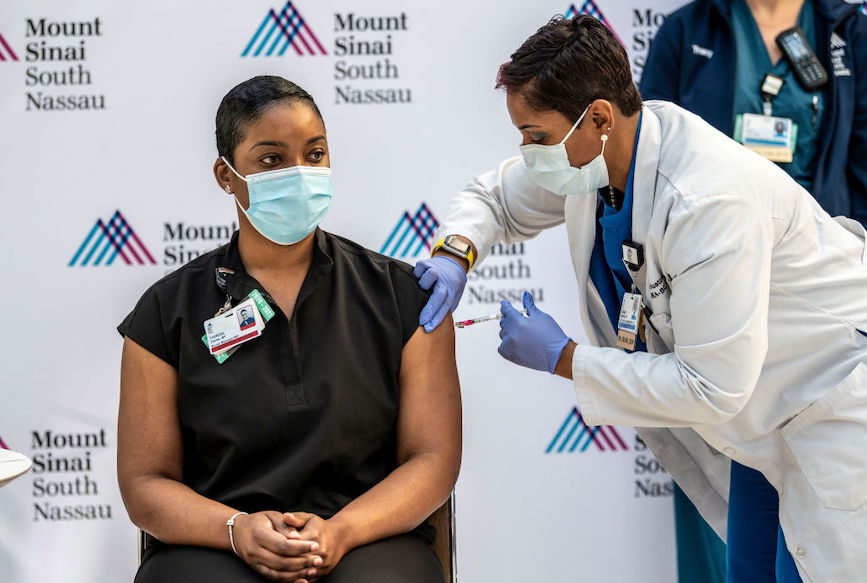Last April, I wrote a letter to my parents, who would have been 104 this year, in the form of an op-ed column in my hometown newspaper in Lancaster, PA. I expressed my hope that, in dealing with the upheaval of the pandemic, we could draw upon the examples they set in coping with the Great Depression as teenagers (without cell phones) and enduring World War II as young parents (without Internet access).
In closing, I promised to write again “to let you know that we rose to the occasion, came together (in mind, if not in body), rode out the COVID-19 storm… in our virtual tornado cellars, and minimized the amount of human suffering.”
Well, here we are, eight months later, and the storm rages on and the suffering mounts, almost beyond comprehension. But I can tell you, Mom and Dad, that as this regrettable year ends, hope is on the near horizon—in the form of new vaccines and novel treatments for this evil disease.
Now if we can just heed the advice of public health experts and show a measurable level of concern for each other, we’ll have a chance to emerge on the other side of this darkness into a better, brighter, more caring world. We’ll keep you posted.
This week’s Coronavirus Briefing is 1,884 words and will take you eight minutes to read.
The vaccines: Who’s on first?
It’s been a busy week. One COVID-19 vaccine is now approved by the FDA for emergency use and another is expected this week, with more to follow. Now comes the rub: vaccines don’t prevent disease, vaccinations do. The first shots went into arms here on Monday.
The takeaway: Take heart, folks. A vaccine is coming to a site near you in the next few months. In the meantime, don’t lose the mask and remember: six socially distanced feet away is the equivalent of two shopping carts, one dog leash or a cow.

Taking arms against a sea of troubles
A CDC document, the COVID Vaccination Interim Playbook, lays out the national distribution plan, while the Department of Health and Human Services is launching a public education campaign to “increase vaccine acceptance and reinforce basic prevention measures.” The latter is aimed at the “Movable Middle”—people not necessarily opposed to vaccines but hesitant, somewhat distrustful and full of questions and concerns.
The takeaway: A playwright couldn’t invent a more stunning plotline: A vaccine rollout begins on a day when the disease, whipping across the country with the fury of a tempest, crests over 300,000 total deaths, the equivalent of 100 repeats of 9/11. Oh I have suffered/with those that I saw suffer.

Tomorrow and tomorrow and tomorrow
While the vaccine campaign moves forward with all deliberate speed, pivoting to pandemic life continues as a daily workout. Our coping mechanisms are getting a ton of reps.
The takeaway: The pandemic is changing the way we live, the way we work and the way we think, testing us every step of the way. Hey, I promised my parents that we'd be up to the task. Can't let them down.

The slings and arrows of outrageous fortune
While the limelight may have shifted to vaccines, the scientific community is still busily unraveling the mysteries of COVID-19—who gets sick and why, and who can get better and how quickly.
Having recovered from COVID-19, Jan Weinstein, a senior-level media buyer at Publicis Health Media, is taking part in clinical trials and making repeated donations of her plasma to help further the science of COVID-19 treatment. Marc Iskowitz shares her inspiring story in MM+M.
There’s still much to learn about who can benefit from the use of convalescent plasma. In Cancer Therapy Advisor, Andrea S. Blevins Primeau covers a key session from the American Society of Hematology annual meeting.
It’s an unfortunate two-way street: A study at the University of Oxford finds that COVID-19 survivors are at increased risk for long-term psychiatric consequences—and that patients recently diagnosed with a psychiatric illness are at increased risk for COVID-19 infection. Jessica Nye has more in Psychiatry Advisor.
Psychiatry Advisor also notes that we are literally losing sleep over the pandemic, while Google searches for “insomnia” are spiking and CPAP machines for people with sleep apnea may exacerbate droplet transmission of the virus.
Acute kidney injury in patients with COVID-19 dramatically increases the risk of death, and that risk is disproportionately high for Black patients. Jody Charnow unpacks recent research in Renal & Urology News.
The takeaway It’s been an unavoidable crash course, but we’ve learned a ton about coronavirus and COVID-19 this year. New Year’s resolution: Accelerate the journey of knowledge from bench to bedside.
The rest
Stuff you can do
...and some songs
December—George Winston. Full album. Just so soothing.
Memories—You’ve heard Maroon 5. Now listen to the One Voice Children’s Choir.
Dynamite--BTS. ‘Cause we all need to dance. Their launch video set a record with 101 million views on YouTube in its first 24 hours.
Feliz Navidad—Celebrating 50 years! Muchas gracias, Jose Feliciano.
We’ll return with the year’s final Haymarket Media Coronavirus Briefing next Wednesday. Until then, Happy Trails, good people. Be safe, be well, be vaccinated.
